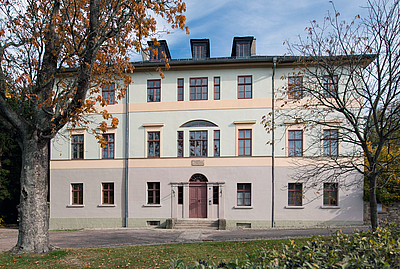History and idea

When the Franz Liszt Centre was founded in 1988, the idea was to reuse the ALTENBURG as Franz Liszt's home during his militant first Weimar period from 1848 to 1861 in the spirit of this special place. This task continues to this day. The culturally and historically important city palace in the Jenaer Str. 3 is a symbol of Liszt's "New Weimar" and the "New German School". For many decades, the ALTENBURG served as a fragmented residential building and was gradually made usable for the university following its renovation in 1995-1997 by the owner - the Weimarer Wohnstätte.
The refurbishment enabled the building to be used for artistic and academic purposes - entirely in the spirit of Franz Liszt. The Franz Liszt Centre assumed responsibility for the content of the Beletage and thus - historically speaking - for the heart of the Stadtpalais. The German Liszt Society, as tenant, is a supporter. After elaborate interior design (including wallpaper in the style of the 1850s) and the installation of new soundproof windows, the entire room, consisting of three interconnected individual salons in blue, red and white, has also been acoustically suitable since March 2002.
Numerous concerts, including the soirées in the Altenburg and cultural and political events, were held in this "Liszt Salon" until 2018. The ALTENBURG developed into a special concert venue with national and international artists and guests and also became a special flagship of the university. Unfortunately, the events currently have to be cancelled due to building regulations.
In the neighbouring Garden Room, the Franz Liszt Centre, together with the German Liszt Society and with the support of the Ministry of Culture, has set up a memorial to the work of Franz Liszt in Weimar. The Liszt Research Centre worked in the rooms facing the courtyard for many years. The Franz Liszt Centre thus served and continues to serve artistic and scientific development projects in the spirit of Franz Liszt, which are closely linked to the identity of the Music university and the historically grown cultural area of Weimar.
The rooms on the ground floor and first floor are now used by the university presidium and parts of the administration.
Members of the Franz Liszt Centre
Prof Christian Wilm Müller - Director
Rebekka Stemmler - Advisor to the President of the University
Christine Gurk - Chancellor of the university
Artistic-scientific projects:
Prof Thomas Steinhöfel, Prof Martin Sturm, Prof Andreas Lehmann, Prof Tim Stolzenburg, Prof Albrecht von Massow
Public relations/guided tours of the ALTENBURG:
Dr Christoph Meixner - Head of the University Archive | Thuringian State Music Archive
